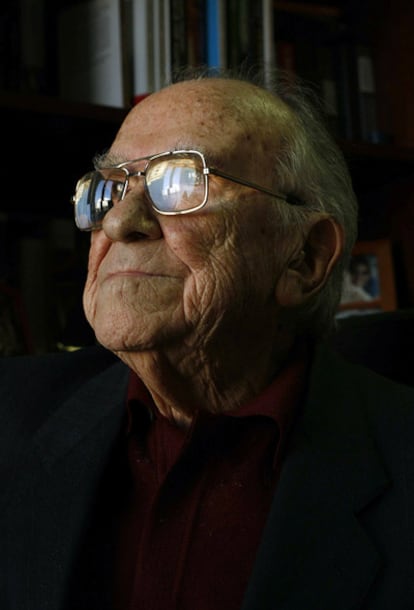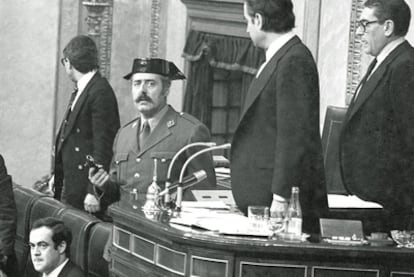Where are they now? Ex-coup leaders live in relative obscurity
"I didn't duck because I thought about honor," recalls Santiago Carrillo
Thirty-two military officers and one civilian were charged with taking part in the coup conspiracy on February 23, 1981. Only three were acquitted. About half a dozen are now dead, including Jaime Milans del Bosch, the commander general who called out the tanks in Valencia.
Antonio Tejero Molina, the former Civil Guard lieutenant colonel who led a group of officers into Congress shouting at everyone "to be still," is now 79 and divides his time between his native Málaga and Madrid. "My father has nothing to say," says his son Ramón, a priest in Málaga. Tejero served 15 years of a 30-year sentence before he was released. In a rare interview with Italian newspaper La Repubblica in 2006, he said: "Someone betrayed us. I complied with my duty as a Spaniard and paid for things I shouldn't have. But history will judge me."
"History will judge me," Tejero told an Italian journalist in 2006
Santiago Carrillo, former Spanish Communist Party (PCE) leader, was in the chamber galley when Tejero and his men stormed the chamber. He, along with then-outgoing Prime Minister Adolfo Suárez, refused to duck under his desk when Tejero started firing. "I thought about history, the honor of Congress, my party and my militancy as a communist." Current congress president José Bono was also present. That night he asked one of his captives to accompany him to get a carton of cigarettes from his office.
Former General Alfonso Armada Comyn, 91, was once the personal secretary to the king before the coup and was considered to be the man who would have become Spanish leader if the conspiracy had succeeded. He spent five years in prison.
"I never knew any of the coup leaders. There has been a lot of lies said about me," he said.


Tu suscripción se está usando en otro dispositivo
¿Quieres añadir otro usuario a tu suscripción?
Si continúas leyendo en este dispositivo, no se podrá leer en el otro.
FlechaTu suscripción se está usando en otro dispositivo y solo puedes acceder a EL PAÍS desde un dispositivo a la vez.
Si quieres compartir tu cuenta, cambia tu suscripción a la modalidad Premium, así podrás añadir otro usuario. Cada uno accederá con su propia cuenta de email, lo que os permitirá personalizar vuestra experiencia en EL PAÍS.
¿Tienes una suscripción de empresa? Accede aquí para contratar más cuentas.
En el caso de no saber quién está usando tu cuenta, te recomendamos cambiar tu contraseña aquí.
Si decides continuar compartiendo tu cuenta, este mensaje se mostrará en tu dispositivo y en el de la otra persona que está usando tu cuenta de forma indefinida, afectando a tu experiencia de lectura. Puedes consultar aquí los términos y condiciones de la suscripción digital.








































